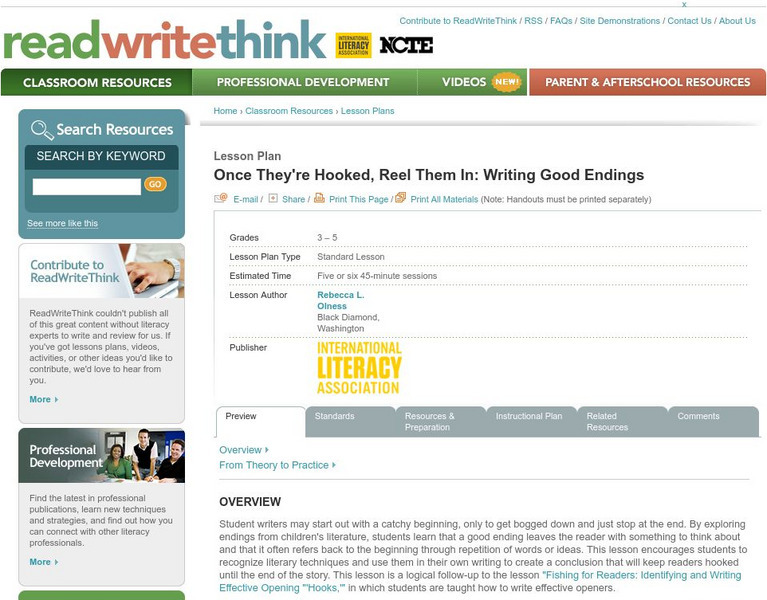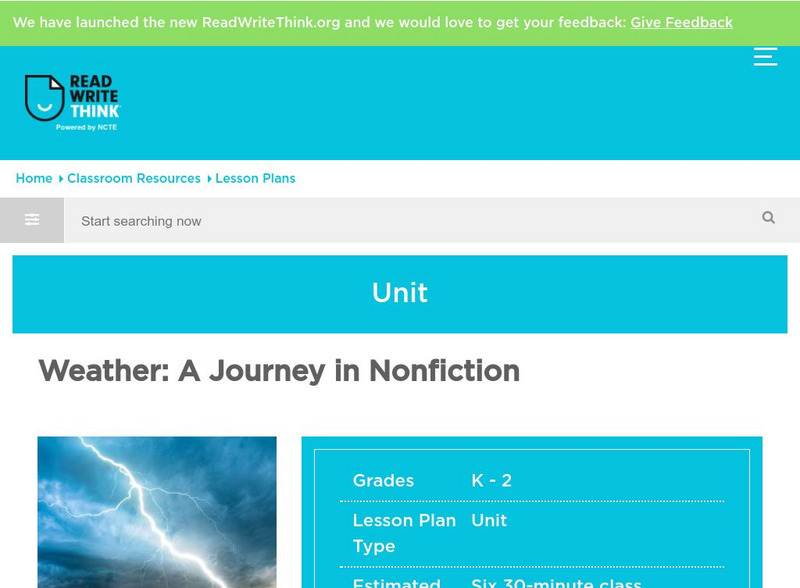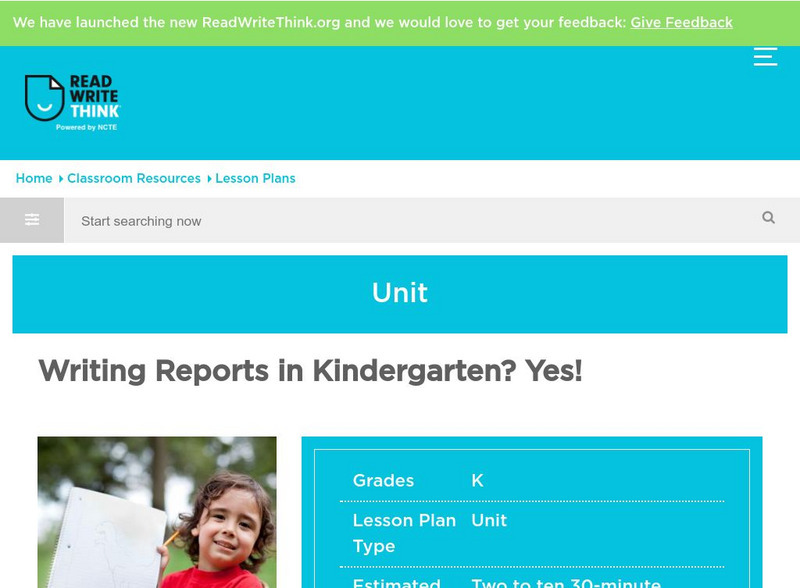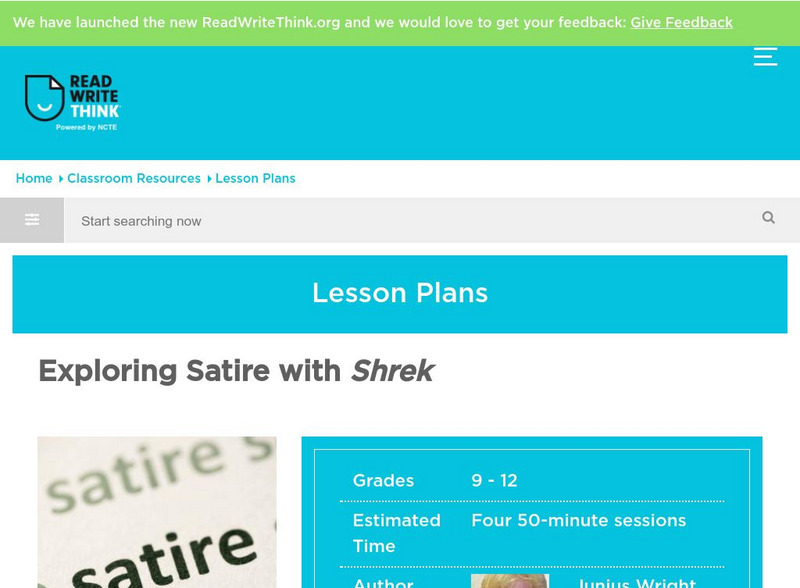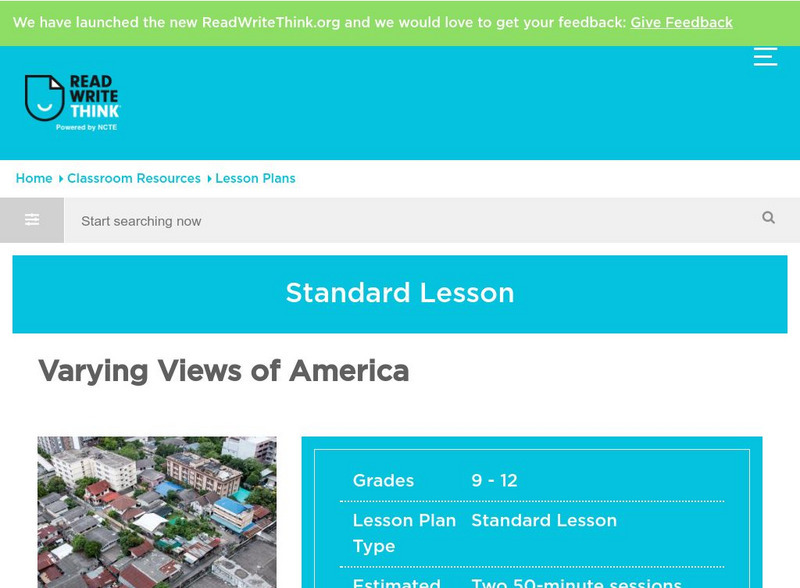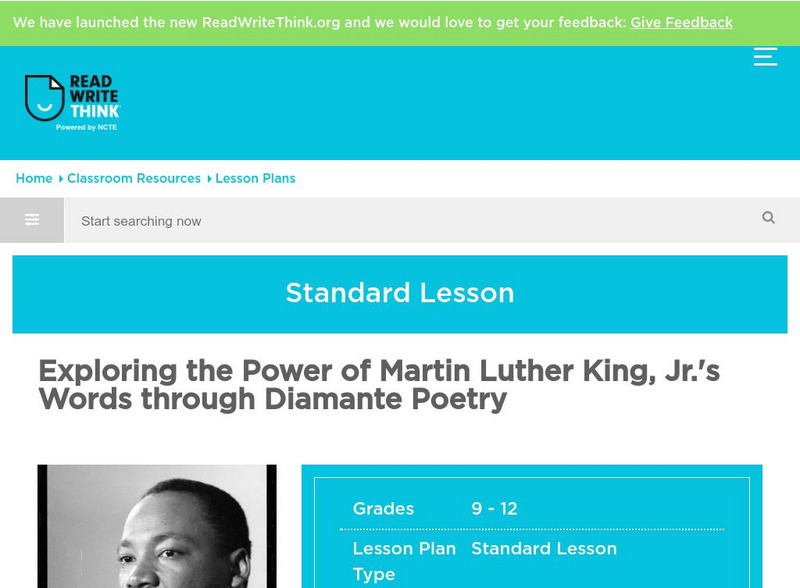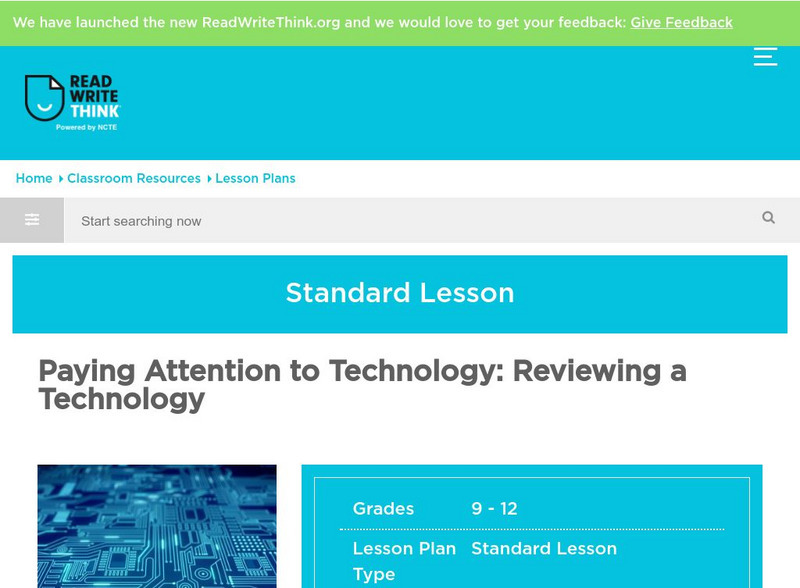ReadWriteThink
Read Write Think: Searching Informational Texts
Online lesson allows elementary students to use prior knowledge, make predictions, and perform research on the Internet. Labeled "The Frog Beyond the Fairy Tale Character," lesson challenges students to examine print and online texts...
ReadWriteThink
Read Write Think: Acquiring New Vocabulary
This lesson teaches elementary students new vocabulary terms through book discussion groups. Students use context clues, prior knowledge, and print and online resources for vocabulary understanding in their discussion.
ReadWriteThink
Read Write Think: Writing Good Endings
This lesson plan explores endings and conclusions to children's literature in an attempt to teach how to successfully write a good ending. Included in the lesson plan are an overview, practice, objectives, resources, preparation, and more.
ReadWriteThink
Read Write Think: Reading Informational Texts Using the 3 2 1 Strategy
Students can count on using the 3-2-1 strategy to help them successfully comprehend and write about an informational text.
ReadWriteThink
Read Write Think: Reading Word Family Words
The focus of the instruction of identification strategies in this lesson plan is the book "Click, Clack, Moo: Cows That Type." Included in the lesson plan is an overview, practice, objectives, resources, preparation, and more.
ReadWriteThink
Read Write Think: Text Talk (Read Aloud)
This online activity supports the language development and reading comprehension of kindergarten through second graders. Through the use of an innovative "Text talk," strategy, students will explain, develop, and expand upon story ideas....
ReadWriteThink
Read Write Think: Digging Up Details on Worms: Using Science in an Inquiry Study
A lesson plan based on a study unit of earthworms, using the inquiry model to integrate scientific processes with literacy practices. Instruction plans, related resources, and standards are included.
ReadWriteThink
Read Write Think: Weather: A Journey in Nonfiction
Questions about weather clear up when students use what they learned from their books to create a presentation to share with the rest of the class.
ReadWriteThink
Read Write Think: Writing Reports in Kindergarten
Lesson which provides three types of reports for early elementary students to share. These allow young students to see themselves as writers with something useful to contribute from an early age.
ReadWriteThink
Read Write Think: Using Curiosity for Descriptive Writing
Lesson plan which allows kindergartners to combine their experiences and curiosity into developing beginning descriptions. Students use memories and illustrations in writing.
ReadWriteThink
Read Write Think: Defining and Exploring an Author's Stylistic Choices
Contains plans for two lessons that teach students how to recognize an author's use of style in literature. These plans use "Their Eyes Were Watching God" by Zora Neale Hurston as an example, but the basic ideas can be adapted to other...
ReadWriteThink
Read Write Think: Teaching Audience in Interactive Writing
Lesson which teaches elementary students the importance and significance of keeping the audience in mind when writing. Students write invitation letters and perform extension activities while learning these concepts. Good resource.
ReadWriteThink
Read Write Think: Collaborative Revising
Lesson in which young scholars engage in an entire-group revising process, using a story which has already been written by the group. An excellent follow-up lesson to the "prewriting and drafting" lesson.
ReadWriteThink
Read Write Think: Using Comprehension Strategies With Elie Wiesel's Night
Working in small groups, students read and discuss Elie Wiesel's memoir Night and then take turns assuming the "teacher" role, as the class works with four different comprehension strategies.RI.11-12.4 Word meaning, RI.11-12.10b Text...
ReadWriteThink
Read Write Think: Creating Question and Answer Books Through Guided Research
Contains plans for five lessons that develop research skills in primary students by having them create their own question and answer books. In addition to objectives and standards, this instructional plan contains links to sites used in...
ReadWriteThink
Read Write Think: Reading/writing About Whales Using Fiction and Nonfiction Texts
Learners will have a whale of a good time in this lesson in which they use fiction and nonfiction texts to write a letter to an online scientist.
ReadWriteThink
Read Write Think: Exploring Satire With the Simpsons
Contains plans for three lessons that use the popular television show "The Simpsons" to teach about satire and satirical techniques. In addition to objectives and standards, this instructional plan contains links to PDF handouts and...
ReadWriteThink
Read Write Think: Exploring Satire With Shrek
The movie Shrek introduces the satirical techniques of exaggeration, incongruity, reversal, and parody. Students brainstorm fairy tale characteristics, identify satirical techniques, then create their own satirical versions of fairy tales.
ReadWriteThink
Read Write Think: Poetry: Varying Views of America
Lesson allows students to examine the various views of American perspective through studying three poems by diverse poets: "I Hear America Singing" by Walt Whitman, "I, Too, Sing America" by Langston Hughes, and "On the Pulse of Morning"...
ReadWriteThink
Read Write Think: Writing and Publishing Book Reviews
This lesson plan outlines classroom methods to teach both how to evaluate and how to write book reviews. Included in the lesson plan is an overview, practice, objectives, resources, preparation, and more.
ReadWriteThink
Read Write Think: Reading Comprehension Through Math Problem Solving
Contains plans for two lessons designed to help primary students' reading comprehension with mathematical story problems. In addition to objectives and standards, this instructional plan contains links to sites used in the lessons as...
ReadWriteThink
Read Write Think: Teaching Poetry Through Riddles
Excellent teaching resource that attempts to teach poetic concepts to middle schoolers by using riddles. Discusses riddles' use of metaphor, simile, and imagery, and relates these concepts to the young scholars' understanding of poetry....
ReadWriteThink
Read Write Think: Exploring Mlk's Words Through Poetry
This online lesson attempts to teach students the power of Martin Luther King's words in his "I Have a Dream" speech and others. Students create a diamante poem (seven-line diamond-shaped poem) to analyze and evaluate his words and...
ReadWriteThink
Read Write Think: Paying Attention to Technology Reviewing a Technology
Contains plans for five lessons that ask learners to write reviews of pieces of technology (cell phones, webcams, ink pens, satellite dishes, etc.) like they would write reviews of books. In addition to objectives and standards, this...




